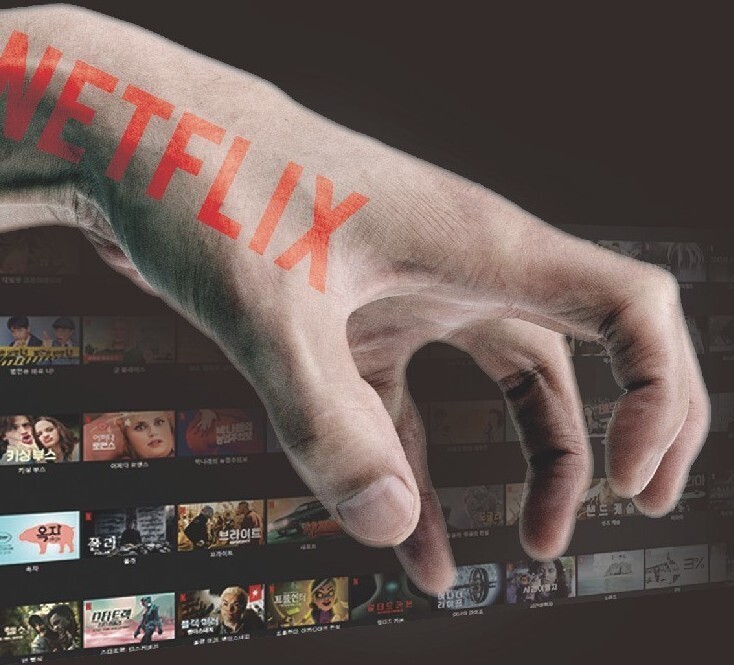hankyoreh
Links to other country sites 다른 나라 사이트 링크
Netflix: the savior of new Korean content or chains around local production companies?

Some see it as a lifesaver that has rescued South Korean film investors and producers from the COVID-19 crisis and spread Korean content around the world. Others see it as the apex predator in the media food chain that relies on heaps of capital to engorge itself on whichever Korean TV series and movies come within its grasp.
Those are two conflicting ways to view Netflix, the world’s largest video streaming service.
On Nov. 20, Netflix announced it would be launching the film “Space Sweepers” online, without a theater release, an announcement that triggered a mixture of hopes and fears in the domestic film industry. Filmed at a cost of 24 billion won (US$21.67 million), “Space Sweepers” represents Korea’s first sci-fi film set in space.
As the COVID-19 pandemic becomes further protracted, Netflix has grown even more powerful. The service has already announced or is expected to announce exclusive rights to a string of films including “Time to Hunt,” “Call,” “What Happened to Mr. Cha?” and “Night in Paradise.”

Netflix controls even more TV series. Beginning with “Kingdom” at the beginning of last year and continuing with “Extracurricular” and “School Nurse Files,” original series funded and produced by Netflix have been well-received by audiences. There are also quite a few Korean productions, including “Mr. Sunshine” and “Crash Landing on You,” that Netflix has released globally under exclusive deals shortly after they were screened in South Korea.
Such TV series have greatly boosted the service’s subscription base in Korea. At the end of September, Netflix announced it had 3.3 million paying subscribers in the country.
Netflix is currently available in 190 countries — nearly the entire world, except for China, North Korea, Syria, and a handful of others. The company’s third quarter report, published on Oct. 21, shows it had 195 million subscribers around the world.
“The Asia-Pacific region accounted for 46% of our quarterly increase of 2.2 million subscribers. In particular, that growth was driven by South Korea and Japan,” Netflix said.
South Korean content is thought to have helped propel Netflix’s growth in the Asian market.
According to FlixPatrol, a website that tracks content popularity on Netflix based on the company’s top 10 daily ratings for each region, the top 100 TV series around the world this year included 10 from South Korea: “It’s Okay to Not Be Okay” at 17th, “The King: Eternal Monarch” at 28th, “Record of Youth” at 41st and “Crash Landing on You” at 55th.
By country, Korean TV series accounted for nine of the top 10 in Malaysia, eight in Vietnam, seven in the Philippines, six in Thailand and Hong Kong, and five in Japan.
“When Netflix began operations in South Korea in 2016, its strategic view of the country was not merely as a market for attracting subscribers but also as a bridgehead for making content to ship into [other countries in] Asia. The figures show that strategy was effective,” said Lim Seok-bong, head of broadcasting policy at JTBC and author of “Next Netflix.”

Counting on the marketability of Korean content, Netflix is broadening its investment, which reportedly amounted to 331.1 billion won (US$299.19 million) this year alone. According to Netflix, its investment in Korean content since 2015 has totaled US$700 million, and Korean producers have made more than 70 “Netflix originals.”
Netflix series are divided between those it directly funds and produces, like “Kingdom,” and those for which it acquires exclusive distribution rights, like “It’s Okay to Not Be Okay.”
“Just a few years ago, we’d send the script for the first couple episodes to tvN or JTBC before anyone else, but nowadays it’s Netflix,” said the CEO of a TV production company.
There’s been a huge increase in the number of producers approaching Netflix about screening films whose theater releases were delayed because of COVID-19. In fact, local content creators are lining up to negotiate with the company.
“Creators prefer Netflix not only because it offers generous funding but also because it doesn’t place restrictions on subject matter or scene composition. That means we can tell the story just the way we like,” said a source who works on TV series.
The worsening decline of the TV advertising market is one of the reasons that content is shifting to Netflix: producers are having trouble getting funding.
“In the past, we’d lined up funding by selling the rights to China and Japan in advance. But since that option is no longer available, Netflix is the only substitute. We see it as a win-win: Netflix gets more high-quality programming, and producers have less trouble getting funded,” said the CEO of a company producing media content.
Netflix is also expected to produce more of its own original variety shows. “’Park Na-rae: Glamour Warning’ has been one of the top 10 Netflix shows in the country this past year. There’s growing interest in variety shows on streaming platforms like Netflix,” said Jang Heok-jae, CEO of Company Sangsang, which produced Netflix variety shows including “Busted!,” “Park Na-rae: Glamour Warning,” and “Twogether.”
“Terrestrial channels place more restrictions on variety shows than dramas. The variety sector is going to rely more on Netflix since streaming services are more hands-off about subject matter. That means that a greater variety of stories can be told,” predicted a source at another company that produces variety shows.

But behind such expectations are considerable concerns that the Korean content industry is being subordinated to Netflix. “Even if ‘Crash Landing on You’ is a big hit in Japan, the production company doesn’t make any more profit aside from its initial payout. Production companies are supposed to make more money if a TV series sells a lot, but that doesn’t happen under Netflix,” explained a source at a content distribution company.
One film producer offered a cynical take on the arrangement: “The bear does the tricks, but Netflix pockets the proceeds.”
“Netflix spends generously on big productions such as ‘Kingdom’ and ‘Space Sweepers,’ but it doesn’t want to invest in small productions. I’m told that the company keeps trying to exploit its position as the dominant player to lower production companies’ rates,” said Choe Jeong-hwa, president of the Producers Guild of Korea.
“The deals offered to films that signed on with Netflix early in the COVID-19 pandemic were quite different from those offered to films that waited to negotiate. Since so many film producers are queued up at Netflix in a bid to recoup their investments, the company can afford to be choosy,” said one source at a film investment company.
Amid these developments, attention is focusing on the potential impact of other global streaming services entering the Korean market. The service iQIyi, a Chinese rival to Netflix, has emerged as a major investor in the Korean content market. Although the company hasn’t been able to release that content in China in the aftermath of the THAAD deployment, it has been buying it up anyway for distribution in the Southeast Asian market.
Just in the first half of 2020, iQIyi has reportedly acquired more than 30 TV series, including “Backstreet Rookie” and “Dinner Mate.” The company recently paid over 25 billion won (US$22.59 million) to acquire the global broadcasting rights (excluding China and South Korea) for “Mount Jiri,” a TV series starring Jun Ji-hyun and Ju Ji-hoon. The series will be released next year by AStory, the production company behind “Kingdom.”
Disney, Apple, HBO set to join competition to acquire Korean contentIf major US streaming services such as Disney Plus, Apple TV Plus, HBO Max and Peacock open business operations in Korea next year, competition to acquire Korean content will likely intensify.
While some expect that such jousting between global streaming services will raise bids for Korean content, more are concerned that this will further tether that content to the global streaming services. The domestic streaming market has been growing by 26.3% a year since 2014, when it was valued at 192.6 billion won (US$174.02 million); the Korea Communications Commission expects the market’s value to reach 708.1 billion won (US$639.76 million) this year.
The concern is that if South Korea lets global streaming services take the lead in this rapidly growing market, the country may find itself little more than a base of content production. Local streaming platforms such as Wavve, TVing and Watcha are fighting the good fight, but they’re no match for Netflix in terms of capital or clout.
Netflix offered the following response to such concerns. “We’re working with Korean artists to build a ‘new Hallyu’ [that is, Korean Wave] that will ultimately bring the unique value and potential of Korean content to the entire world, helping revitalize the Korean creative ecosystem.”
What about criticism that the profit from successful content doesn’t trickle down to the artists? “Our goal is to preserve the intent of the artist and the value of their work to the greatest extent possible while shouldering risks associated with profitability. The artists we’ve worked with have described that in positive terms,” Netflix explained.
“Netflix can be an ally or an enemy, depending on the situation. In a time as challenging as the present, Netflix offers the easiest way to get into the global market. But given its increased clout, Netflix could also throw its weight around,” said Lim Seok-bong.
“Korean content makers should be strategic when they draw up their sales plans,” he advised.
By Suh Jung-min and Nam Ji-eun, staff reporters
Please direct comments or questions to [english@hani.co.kr]

Editorial・opinion
![[Guest essay] The real reason Korea’s new right wants to dub Rhee a founding father [Guest essay] The real reason Korea’s new right wants to dub Rhee a founding father](https://flexible.img.hani.co.kr/flexible/normal/500/300/imgdb/original/2024/0423/8317138574257878.jpg) [Guest essay] The real reason Korea’s new right wants to dub Rhee a founding father
[Guest essay] The real reason Korea’s new right wants to dub Rhee a founding father![[Column] ‘Choson’: Is it time we start referring to N. Korea in its own terms? [Column] ‘Choson’: Is it time we start referring to N. Korea in its own terms?](https://flexible.img.hani.co.kr/flexible/normal/500/300/imgdb/original/2024/0423/3617138579390322.jpg) [Column] ‘Choson’: Is it time we start referring to N. Korea in its own terms?
[Column] ‘Choson’: Is it time we start referring to N. Korea in its own terms?- [Editorial] Japan’s rewriting of history with Korea has gone too far
- [Column] The president’s questionable capacity for dialogue
- [Column] Are chaebol firms just pizza pies for families to divvy up as they please?
- [Column] Has Korea, too, crossed the Rubicon on China?
- [Correspondent’s column] In Japan’s alliance with US, echoes of its past alliances with UK
- [Editorial] Does Yoon think the Korean public is wrong?
- [Editorial] As it bolsters its alliance with US, Japan must be accountable for past
- [Guest essay] Amending the Constitution is Yoon’s key to leaving office in public’s good graces
Most viewed articles
- 1[Guest essay] The real reason Korea’s new right wants to dub Rhee a founding father
- 2Terry Anderson, AP reporter who informed world of massacre in Gwangju, dies at 76
- 3[Column] ‘Choson’: Is it time we start referring to N. Korea in its own terms?
- 4Why Korea shouldn’t welcome Japan’s newly beefed up defense cooperation with US
- 5Opposition calls Yoon’s chief of staff appointment a ‘slap in the face’
- 6[Column] The clock is ticking for Korea’s first lady
- 7Senior doctors cut hours, prepare to resign as government refuses to scrap medical reform plan
- 8New AI-based translation tools make their way into everyday life in Korea
- 9[Editorial] Japan’s rewriting of history with Korea has gone too far
- 10[Column] Are chaebol firms just pizza pies for families to divvy up as they please?